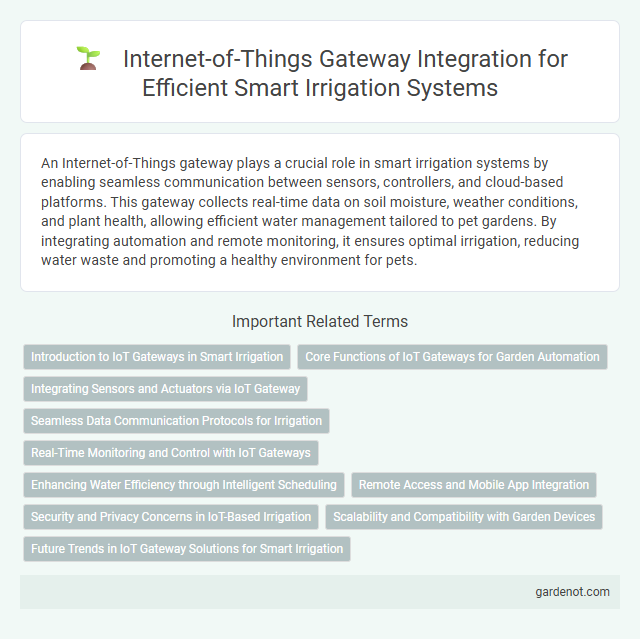An Internet-of-Things gateway plays a crucial role in smart irrigation systems by enabling seamless communication between sensors, controllers, and cloud-based platforms. This gateway collects real-time data on soil moisture, weather conditions, and plant health, allowing efficient water management tailored to pet gardens. By integrating automation and remote monitoring, it ensures optimal irrigation, reducing water waste and promoting a healthy environment for pets.
Introduction to IoT Gateways in Smart Irrigation
IoT gateways in smart irrigation serve as critical nodes that collect, process, and transmit data from soil moisture sensors, weather stations, and water flow meters to cloud platforms for real-time analysis. These gateways enable efficient water management by integrating multiple sensor inputs via protocols like LoRaWAN, Zigbee, or NB-IoT, ensuring low latency and reliable connectivity in agricultural environments. Advanced IoT gateways support edge computing capabilities, allowing localized decision-making to optimize irrigation schedules and reduce water waste.
Core Functions of IoT Gateways for Garden Automation
IoT gateways in smart irrigation enable seamless communication between soil moisture sensors, weather stations, and cloud platforms to optimize water usage. They process real-time data locally to trigger irrigation valves, reducing latency and conserving water resources. Core functions include device management, protocol translation, and secure data transmission for efficient garden automation.
Integrating Sensors and Actuators via IoT Gateway
Integrating sensors and actuators through an Internet-of-Things (IoT) gateway enables real-time data collection and precise control in smart irrigation systems, optimizing water usage and crop health. IoT gateways facilitate seamless communication between soil moisture sensors, weather stations, and automated valves, ensuring efficient irrigation schedules based on environmental conditions. Advanced protocols like MQTT and CoAP enhance data transmission reliability, promoting scalable and responsive agricultural management solutions.
Seamless Data Communication Protocols for Irrigation
Internet-of-Things (IoT) gateways in smart irrigation systems enable seamless data communication through protocols such as MQTT, CoAP, and LoRaWAN, ensuring reliable sensor data transfer and remote control. These protocols optimize network efficiency by minimizing power consumption and latency, crucial for real-time soil moisture monitoring and irrigation scheduling. Integration of secure MQTT brokers and edge computing capabilities enhances data accuracy and system responsiveness for precision agriculture applications.
Real-Time Monitoring and Control with IoT Gateways
IoT gateways in smart irrigation enable real-time monitoring of soil moisture, weather conditions, and water usage, ensuring precise control over irrigation schedules. These gateways collect data from multiple sensors, process it locally, and transmit actionable insights to cloud platforms for optimized water management. By integrating machine learning algorithms, IoT gateways facilitate adaptive irrigation, reducing water waste and enhancing crop yields.
Enhancing Water Efficiency through Intelligent Scheduling
IoT gateways in smart irrigation integrate sensor data and weather forecasts to enable intelligent scheduling, optimizing water usage and reducing waste. These gateways process real-time environmental inputs, adjusting irrigation cycles based on soil moisture levels and evapotranspiration rates. Implementing IoT-driven scheduling significantly enhances water efficiency by delivering precise water amounts only when necessary.
Remote Access and Mobile App Integration
Internet-of-Things gateways for smart irrigation enable seamless remote access by connecting sensors and controllers to cloud platforms, allowing users to monitor soil moisture, weather conditions, and water usage from anywhere. Mobile app integration offers intuitive control over irrigation schedules, real-time alerts, and data analytics, enhancing water efficiency and reducing waste. This connectivity leverages secure communication protocols and edge computing to optimize irrigation based on precise environmental data.
Security and Privacy Concerns in IoT-Based Irrigation
IoT gateways in smart irrigation systems serve as critical security checkpoints, encrypting data transmissions between sensors and cloud platforms to prevent unauthorized access and cyber-attacks. Protecting sensitive information such as soil moisture levels and irrigation schedules requires robust authentication mechanisms and regular firmware updates to mitigate vulnerabilities. Privacy concerns demand that gateways implement strict data anonymization and comply with industry standards like GDPR to safeguard user data from exploitation.
Scalability and Compatibility with Garden Devices
An Internet-of-Things gateway for smart irrigation ensures seamless scalability by supporting numerous sensor nodes and irrigation controllers across vast garden areas, enabling efficient water usage management. Compatibility with various garden devices, including soil moisture sensors, weather stations, and automated valves, is achieved through standardized protocols such as Zigbee, LoRaWAN, and MQTT. This interoperability allows precise real-time data collection and control, optimizing irrigation schedules to promote healthy plant growth and conserve water resources.
Future Trends in IoT Gateway Solutions for Smart Irrigation
Future trends in IoT gateway solutions for smart irrigation emphasize enhanced edge computing capabilities to process data locally, reducing latency and bandwidth usage. Integration of AI-driven analytics within gateways enables precise water management by predicting crop water needs based on real-time environmental data. Emerging wireless protocols like 5G and LPWAN are improving connectivity and scalability for distributed irrigation systems in remote agricultural areas.
Internet-of-Things gateway Infographic

 gardenot.com
gardenot.com